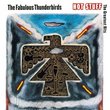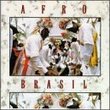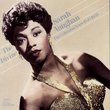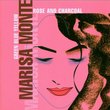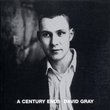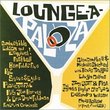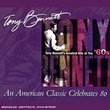| All Artists: Gyorgy Ligeti, Esa-Pekka Salonen, Philharmonia Orchestra and Chorus, Derek Lee Ragin, London Sinfonietta Voices, Charlotte Hellekant, Jard Van Nes Title: Ligeti: Le Grand Macabre [Gyorgy Ligeti Edition Vol 8] Members Wishing: 3 Total Copies: 0 Label: Sony Classical Original Release Date: 1/1/1997 Re-Release Date: 3/23/1999 Genre: Classical Styles: Opera & Classical Vocal, Historical Periods, Modern, 20th, & 21st Century, Symphonies Number of Discs: 2 SwapaCD Credits: 2 UPC: 074646231227 |
Search - Gyorgy Ligeti, Esa-Pekka Salonen, Philharmonia Orchestra and Chorus :: Ligeti: Le Grand Macabre [Gyorgy Ligeti Edition Vol 8]
![Ligeti: Le Grand Macabre [Gyorgy Ligeti Edition Vol 8]](https://nationalbookswap.com/cd//l/26/9726/6059726.jpg) | Gyorgy Ligeti, Esa-Pekka Salonen, Philharmonia Orchestra and Chorus Ligeti: Le Grand Macabre [Gyorgy Ligeti Edition Vol 8] Genre: Classical
It's apocalypse now in Hungarian composer György Ligeti's brilliantly imaginative opera about a comic-book Armageddon. Ligeti revised and tightened the original 1970s version of this masterpiece, which boils over with... more » |
Larger Image |
CD DetailsSynopsis
Amazon.com's Best of 1999 It's apocalypse now in Hungarian composer György Ligeti's brilliantly imaginative opera about a comic-book Armageddon. Ligeti revised and tightened the original 1970s version of this masterpiece, which boils over with Brechtian grotesques. Conductor Esa-Pekka Salonen, always sensitive to the pulse of the most compelling contemporary music, brings off a wacky, threatening, sardonic, and exhilarating account. --Thomas May Similarly Requested CDs
|
CD ReviewsNot the only jewel in the crown. Andrew Hansen | Chicago, IL USA | 12/10/1999 (4 out of 5 stars) "Amazon can't seem to recommend this one enough. I wish that made me happy. As it is, I find it frustrating. Opera seems to take precedence in critical and intellectual circles as an inherently superior medium of musical expression. I find this tragic, since Opera is as much or more about theater (actors, costumes, lights, pyrotechnics, etc.) than it is about music.Le Grande Macabre is certainly one of Ligeti's monumental works and this is very much a recording worthy of owning if contemporary opera is of interest to you. I don't feel it appropriate to comment on the performances since experience has taught me that every listener has their own agenda and each grades a performance according to those criteria. He who has ears, let him listen...My principle reason for posting this review is to encourage passers by to examine Ligeti's instrumental works, particularly the Chamber Concerto, the fabulous Wergo release containing Lontano and other orchestral works, and the piano etudes. Le Grande Macabre is, more or less, a composite of the ideas Ligeti has explored throughout his career. But as Ligeti is obedient to the requirements of storytelling, in the opera these ideas are decoration. In his other works, they are the substance." One of the few contemporary masterworks in opera drabauer | Irvine, CA USA | 02/06/2005 (5 out of 5 stars) "I will not bother defending Le Grande Macabre for those dismayed at how it differs from earlier Ligeti; having studied the works from 1943 on, I hear a continuity that others may miss. Know only that the opera was influenced by the visual arts of Bosch, Brueghel and Saul Steinberg, the operas of Monteverdi and Verdi, the absurdist theater of Alfred Jarry, and the films of Charlie Chaplin. In other words, be forewarned! Having not seen the recent San Francisco production I can only imagine the wild visuals, but the performers in this spanking new edition are spot on. Ligeti has considerably abridged and tightened the opera (first written in 1974-77), and has greatly refined his original vision (the composer has even gone on record preferring the English libretto to the original German.) The Wergo original is of interest primarily to completists. Let me just add that history is everywhere present in LGM; this is the closest Ligeti's come to a "collage" work, which seems completely appropriate given the darkly surreal subject matter. He would never produce something quite like this again, but let us hope against hope that he finishes the long running operaplanned on the Alice books. For more about Ligeti, I recommend the Richard Steinitz work and life (although the earlier bios by Griffiths, Toop and Burde are great as well)." Fun, if utterly bizarre Casey R. Law | 09/29/1999 (4 out of 5 stars) "I love Ligeti's music and I never fully understood why. I don't care for most contemporary composers, but I feel that he always has something very interesting to say and it goes way beyond the cacophony normally associated with contemporary music. To be frank there's enough dissonance in this work to make most people cringe, but, again, there's something to the way he approaches music and sound that elevates his works way above the banal or ugly and irritating, like Cage and Carter. Like Penderecki, Ligeti has his own musical vocabulary and he's not afraid to either use it or add to it when necessary. The result in "Le Grand Macabre" is a surrealistic soundscape that compliments the equally surrealistic tale of an imaginary kingdom and it's odd inhabitants. Truly bizarre and, definitely, not for everyone. Nevertheless, a truly great work. As original and wonderfully bizarre as one could only hope for. The performance is wonderful and most cohesive. Not an easy thing to accomplish with a work of this magnitude and complexity."
|

 Track Listings (14) - Disc #1
Track Listings (14) - Disc #1
